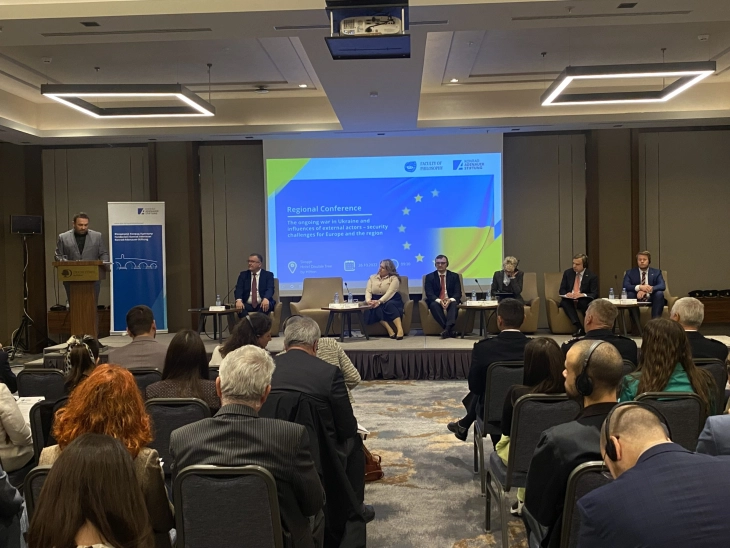Conflict in Ukraine requires prevention of consequences, EU facing retake exam in Balkans: conference

Skopje, 26 September 2022 (MIA) – It is necessary to face the new reality and develop new strategies as a response and prevention of the consequences of the tectonic social changes caused by the Russian military aggression against Ukraine. The EU is facing a retake exam in the Balkans and should offer financial and energy support package for the region to prevent the entry of third parties and the growth of Euroscepticism in the region, said participants in Wednesday’s regional conference “The ongoing war in Ukraine and influences of external actors – security challenges for Europe and the region”, organized by the Faculty of Philosophy and Konrad Adenauer Foundation.
“The consequences for the economic security of the Republic of North Macedonia from the war in Ukraine are inevitable, and hence all together, the business community and the state should find appropriate solutions to prevent major economic security issues that can initiate social unrest in the coming period in the country and in the region. Also, the impact of the war in Ukraine and the Russian military aggression includes impact on identity, i.e. social security, as a result of which certain radical extremist national groups that are in the country have been awakened in order to abuse certain open issues that we have in the Balkans,” said Marjan Gjurovski, professor at the Faculty of Philosophy.
According to him, the Russian military aggression in Ukraine should awaken the EU, unite NATO, but it should also give answer as to where the EU will move in the next period.
“The EU is facing a retake exam in the Balkans, and I believe the package that the head of the EC will offer to the Balkans will include specific economic figures, financial and energy support, because in this way, by delaying the negotiation process, having no serious financial support for the countries in the region, and by getting energy, and getting vaccines two years ago from the north, which is an open door to Russian and Chinese influence in the Balkans, it absolutely leads to different influences and Euroscepticism among Macedonian citizens,” Gjurovski stressed.
He pointed out that there is a significant change in public opinion and support for the country's European path, as seen in public opinion polls, and if last year Macedonian citizens had a dilemma regarding the policy of the Russian Federation, China’s support, now, he noted, somewhere over 15 percent of respondents declare that Russia is an enemy state.
Daniel Braun, director of the Konrad Adenauer Foundation, said this issue is important for the whole Europe, both for Germany and for North Macedonia.
“With the start of the war on February 24, historic censorship happened in Europe and this is something we will have to get used to and will have to deal with in the future. I think that we should all know that the world will not be as it was before February 24, probably not in the foreseeable future, and therefore it is very important for Central Europe, but also for this region, for the Western Balkans to face the new reality and develop new strategies for such a new future,” Braun said.
The conflict in Ukraine, which is now in its eighth month, will not end soon, according to professor Tatyana Dronzina from the Sofia University.
Asked how the war in Ukraine affects the Balkans and how the relations between the Balkan states, particularly between North Macedonia and Bulgaria can be abused by Moscow, Dronzina said there are no changes in Russia's course towards the region, adding that both countries continue to be victims of hybrid attacks.
As to how easily Moscow can use the disagreement between Skopje and Sofia and how much it has been abused so far, the Bulgarian professor believes that it has been quite abused.
In the context of the war in Ukraine, UKIM Rector Nikola Jankulovski said that faced with hybrid threats and attempts at hybrid intrusions within societies, the need for ever greater care and protection of critical infrastructure, primarily cyber or digital infrastructure, which becomes more important than physical infrastructure, requires a strategic state and regional approach. One of the main tasks of this conference, he said, is precisely to contribute to a better understanding of the consequences of radical social changes: the way they affect the disruption of social cohesion, changes in behavior patterns and value systems, as well as the strategies that individuals and groups undertake to deal with the consequences of change.
The aim of the debate is to give a platform for the exchange of knowledge and experience between university professors and experts in the field of security and international relations from the region, namely North Macedonia, Bulgaria, Serbia, Montenegro, as well as Germany.







